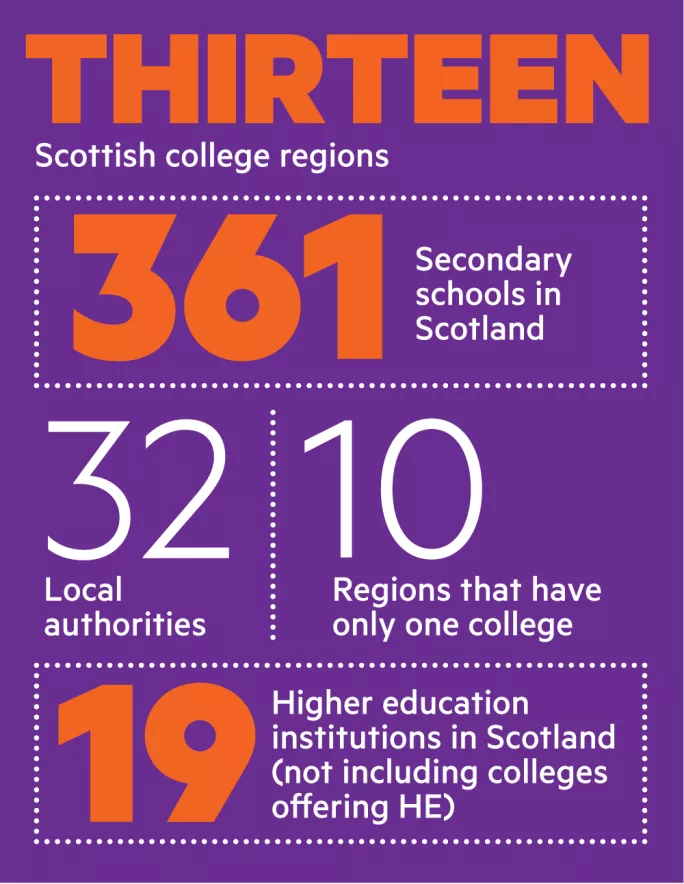Colleges Scotland: put FE at the heart of regional hubs

Further education institutions should lead the way in establishing a network of regional education and skills hubs across Scotland, according to the umbrella body for colleges.
This network should include schools, colleges, universities and local authorities, as well as employers and community planning partnerships, an article published by Colleges Scotland argues.
These hubs, which could be aligned with the 13 Scottish college regions, would provide a much-needed “joined-up approach” for the whole of the education system, the organisation says.
Greater choice and continuity
The benefits of this plan could be even greater if the government’s proposed new “educational regions” - which would make local authorities work together and share resources - are based around the existing college regions, the body adds.
But council bosses described the idea of organising education around the college regions as “a no-no” and said this was the “last choice for anything to be modelled on”.
The Colleges Scotland article says that the role of the hubs could include bringing in standardised articulation routes from college to university, increasing the choice of courses in schools, setting up common application processes and sharing data.
The hubs would also provide more opportunity for partnership-working and create efficiencies, it notes, adding: “The consultation on new regional education boards for Scotland as part of the schools governance review could be a timely opportunity to develop a collaborative leadership model.”
Any move towards hubs would help to develop “a common approach” and “consistent policy implementation” between education providers, and improve education and skills provision across the board, according to the article.
‘It is not about taking money away from schools and universities but using it effectively’
Speaking to TESS, a spokesman for Colleges Scotland said that regional colleges should be at the core of the new hubs, as they had already established strong relationships with the employers and local authorities in their areas.
Increasing cooperation would also create efficiencies at a time of significant financial pressures. “It is not about taking money away from schools and universities, it is about using the money that is already in the system as effectively as we can,” he said.
The article adds: “Progress is clearly being made across the educational landscape, but much remains to be done. There is, as yet, little sense of a national pattern, nor of comparable opportunities being made available to all pupils across Scotland.”
It argues that uncertainty about the future after the Brexit vote, and amid tightening budgets, means that it is important for education to prove that it is offering “clear value for money” to taxpayers.
Liz McIntyre, principal of Borders College, said: “Colleges are well placed because of their experience and expertise. What they also already have at the regional level is an extensive network of agencies. They understand the regional skills needs, and they are absolutely committed to the journey for learning being smoother.”
‘Structural reform is wrong’
However, councillor Stephanie Primrose, education spokesperson for local authorities’ body Cosla said: “It is both our position and clear understanding that there is to be no structural review of education. Structural reform is not only wrong, it is costly and very, very disruptive.
“In addition, I am crystal clear that the college model would be our last choice for anything to be modelled on.
“Cosla fully encourages collaboration and working together across boundaries, but as for structural change, that is a no-no, and most certainly not [structural change] based on the college model.”
A Scottish government spokesman said: “The introduction of new educational regions will encourage the sharing of good practice and best value. It will build capacity and deliver the best outcomes for children and young people.
“We will, of course, be inviting our FE sector to play a full role in taking forward our agenda for education beyond school and look forward to hearing more about their views on what might make the most difference for our young people.”

You need a Tes subscription to read this article
Subscribe now to read this article and get other subscriber-only content:
- Unlimited access to all Tes magazine content
- Exclusive subscriber-only stories
- Award-winning email newsletters
Already a subscriber? Log in
You need a subscription to read this article
Subscribe now to read this article and get other subscriber-only content, including:
- Unlimited access to all Tes magazine content
- Exclusive subscriber-only stories
- Award-winning email newsletters